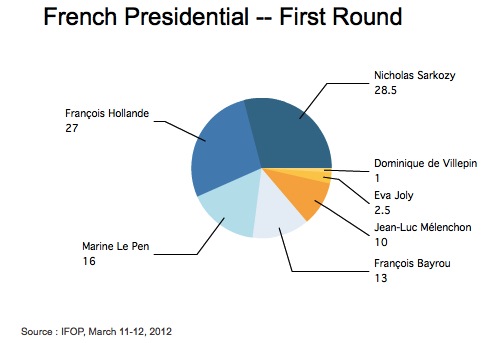Today’s news was mixed for French president Nicolas Sarkozy.
![]() A new poll shows him with his first-ever lead in the first-round April 22 presidential election — at 28.5% to just 27% for Partis socialiste candidate François Hollande. Hollande has a slimmer but still quite commanding second-round lead, where he polls 54.5% to Sarkozy’s 45.5% for the May 6 runoff.
A new poll shows him with his first-ever lead in the first-round April 22 presidential election — at 28.5% to just 27% for Partis socialiste candidate François Hollande. Hollande has a slimmer but still quite commanding second-round lead, where he polls 54.5% to Sarkozy’s 45.5% for the May 6 runoff.
Centrist François Bayrou held steady at 13%, but Front National candidate Marine Le Pen lost a point from the prior survey and Jean-Luc Mélenchon gained 1.5%, at 10% his highest poll rating to date. The shift of voters away from Le Pen (presumably to Sarkozy) and to Mélenchon (presumably away from Hollande) is more than enough to explain first-round movement between Hollande and Sarkozy.
Looming on the horizon, however, are explosive charges from Mediapart, a French investigative website, that Sarkozy illegally received over €50 million from Muammar Gaddafi to finance his 2007 presidential campaign. Sarkozy has denied the charges — and snarked that if true, Gaddafi certainly didn’t get his money’s worth, as Sarkozy joined British prime minister David Cameron in the NATO-led bombing campaign against Libyan dictator Muammar Gaddafi last year. The charges remain very much unsubstantiated, though.
It is worth noting, however, that many French politicians have gotten in trouble for having troubling ties to dictators, especially in Africa and the Middle East, especially in those countries where former colonial ties remain strongest.
Most recently, Sarkozy’s foreign minister Michèle Alliot-Marie was forced to resign in February 2011 after links to former Tunisian President Zine El-Abidine Ben Ali surfaced, including the use of Ben Ali’s private jets and holiday vacations in Tunisia. If the illegal Gadaffi donation allegations proved true, it would present a staggering portrait of corruption at the heart of Sarkozy’s presidency.
In many ways, Sarkozy’s tough talk on Gaddafi was an attempt to compensate for the Alliot-Marie affair and a more generally nonchalant posture by the French toward the initial Tunisian protestors. Sarkozy moved rapidly to demonstrate that France took the 2011 ‘Arab Spring’ seriously and that France would firmly stand alongside pro-democracy protestors. That change in tone, however, came against the France’s longstanding coziness with many African and Middle Eastern dictators — remember that Sarkozy once hosted Gaddafi in his Bedouin tent on the grounds of the Elysée and that many leaders (including then-UK prime minister Tony Blair) had generally welcomed Gaddafi back into the international community by 2007.
So while it may be unlikely that Sarkozy really did take illegal contributions from Gadaffi, the story highlights the sort of hypocrisy of which has marked every French presidency in the post-colonial era, including Sarkozy’s.
D7FTCE9ZX9RR
